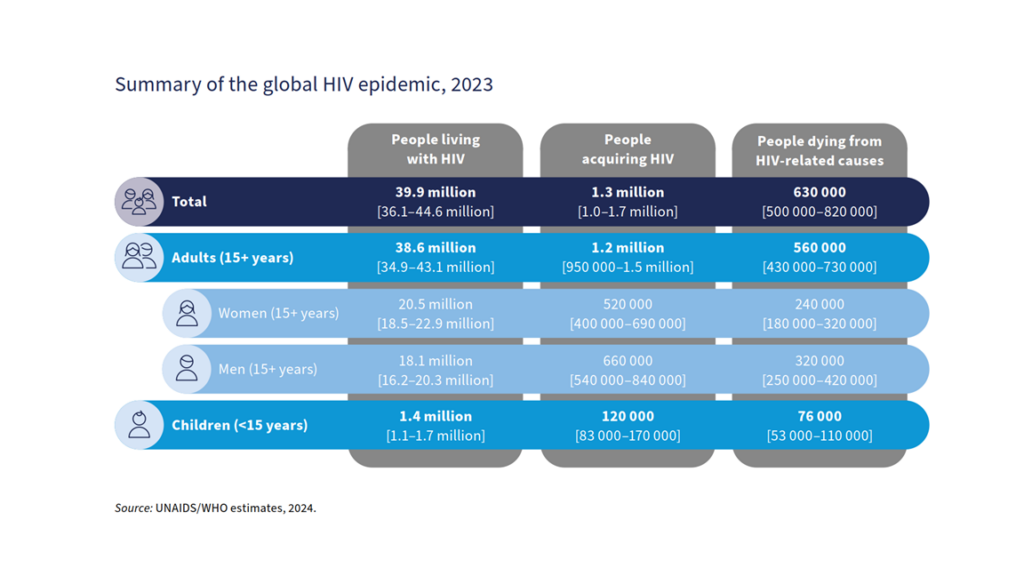Each year, December 1st marks World AIDS Day. It honors those lost to AIDS-related illnesses, celebrates the resilience of people living with HIV, and reflects on our ongoing battle against the epidemic. This year’s theme is ‘Take the Rights Path’ (UNAIDS, 2024). The message brings a powerful focus on human rights, equality, and justice as critical components in the response to HIV/AIDS. It also reminds us that ensuring the dignity and rights of all individuals living with or affected by HIV/AIDS is essential to achieving effective prevention, treatment, and the shared responsibility of fostering worldwide inclusive care.
What Does the Current AIDS Landscape Look Like?
Estimates suggest that over 31,000 people in the U.S. acquired new HIV infection in 2022. Current estimates list 1.2 million people as diagnosed with HIV in the U.S., with 13 percent of them unaware they need testing. Worldwide, in 2023, 39.9 million people are living with HIV; this includes 1.4 million who are children younger than 15 years old (HIV.gov, Aug. 2024).
An HIV diagnosis means the individual is infected with the human immunodeficiency virus. Although treatable, there is no cure for HIV infection, and thus infected individuals require antiretroviral therapy. This treatment seeks to suppress the amount of HIV (viral load) in the blood to maintain a healthy immune system. When someone with HIV is untreated, AIDS is the late stage of HIV infection. Individuals with AIDS have severely damaged immune systems, which leaves their bodies defenseless against other infectious diseases.
What are Recent News Involving AIDS?
“Take the Rights Path” serves as a reminder of the universal right to healthcare. Antiretroviral therapy (ART) has transformed HIV from a once-fatal diagnosis to a manageable chronic condition for many. However, access is still far from universal. One of the most exciting clinical trial results released earlier this year may revolutionize HIV treatment, as a long-acting drug called lenacapavir seems to be 96% effective in preventing HIV infections.
The study was conducted in the United States, Thailand, South Africa, Peru, Mexico, Brazil, and Argentina. It also involved over 3,200 cisgender men, transgender men and women, and gender non-binary individuals. In a two-year study, groups that received this drug as a pre-exposure prophylaxis have reported 99% effectiveness in the prevention of HIV infection through sex (Gilead, 2024). The drug is a twice-yearly subcutaneous injection, which would increase the compliance rate compared to oral daily medicines. The FDA approved Lenacapavir in 2022 for HIV treatment, but this is the first test for HIV prevention. For more information on this clinical trial and results, click here.
What Does this Mean for Us on World AIDS Day?
With these early positive results, the pharmaceutical research company (Gilead) hopes to launch lenacapavir globally in 2025. One primary concern is the cost of this drug for equal access globally. The annual cost of lenacapavir in 2023 was about $42,250 (USD) per person, a prohibitive number for many developing countries. Ensuring equitable access to ART, particularly in less prosperous countries where the burden of HIV/AIDS is highest is a critical component of “taking the rights path” and advancing global health equity.
A human rights-centered approach also highlights the need for comprehensive education on HIV/AIDS prevention and care, one of the most powerful tools against the spread of HIV. Education empowers individuals and communities to make informed choices about their health and helps to dispel myths that contribute to the stigmatization of HIV/AIDS. As healthcare professionals, we have many opportunities to educate our clients about HIV/AIDS. Staying on top of medical trends, policies, and approved treatments through continuing education also ensures we provide clients with the most relevant information.
Ultimately, “Take the Rights Path” is a call to action. This World AIDS Day, this can mean advocating for fairer policies, volunteering with community support groups, supporting organizations that provide HIV care and education, or simply being an ally to those often overlooked and marginalized.
For more on AIDS, view our course catalog on this topic here.
Author: Angie Jung, RN, BSN, CRRN, CCM
References:
Gilead. Full Efficacy and Safety Results for Gilead Investigational Twice-Yearly Lenacapavir for HIV Prevention Presented at AIDS 2024. July 24, 2024. https://www.gilead.com/news/news-details/2024/full-efficacy-and-safety-results-for-gilead-investigational-twice-yearly-lenacapavir-for-hiv-prevention-presented-at-aids-2024
https://www.hiv.gov/hiv-basics/overview/data-and-trends/statistics. Fast Facts, August 15, 2024.
UNAIDS (United Nations Programme on HIV/AIDS) https://www.unaids.org/en/2024-world-aids-day#:~:text=Take%20the%20rights%20path%20%2D%20World,public%20health%20threat%20by%202030.




